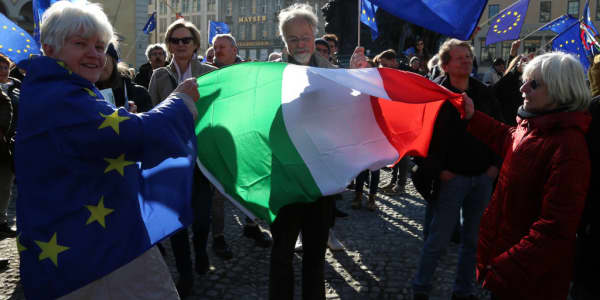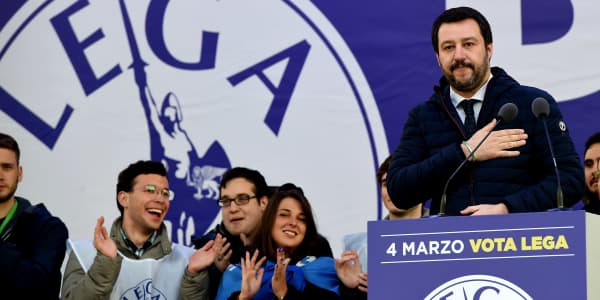There is a risk of Italy's mafias "conditioning" the general election in March, Italy's Interior Minister Marco Minniti warned.
Italians go to the polls on March 4 and Minniti said there was "too much silence" on the "concrete" risk of the mafias posing a threat to democracy and "the freedom to vote," Italian news agency ANSA reported.
"We're in the swing of the electoral competition and … There is a concrete risk of the mafias conditioning electors' free vote," Minniti said on Wednesday as he presented an annual report to the Anti-Mafia commission in Rome.
"The mafias are able to condition institutions and politics," Minniti, a minister that belongs to the ruling Democratic Party (PD) warned.
"On these issues there cannot be a silence in the electoral campaign, I see too much silence on these issues, I say this as minister of the interior," he said, the Corriere della Sera newspaper reported.
Italy has a number of organized crime groups, the largest being the Calabria-based 'Ndrangheta, the Sicily-based Cosa Nostra and the Campania-based Camorra. All three organized crime groups have featured in vote-buying cases over the years, ANSA noted.
Mafia vote-buying has been widely reported with various politicians investigated for the practice at a local and regional level. In 2014, the Italian Senate passed a reform to toughen up legislation against Mafia vote-buying although it's still taking place. Statistics portal Statista notes that the number of individuals arrested for mafia vote-buying in Italy grew from 6 to 17 total cases, between the second semester of 2015 and the first semester of 2016.
The battle between the Italian state and organized crime groups has been muddled and murderous over the decades of the 20th century. Many Italian politicians whether local, regional and national have often been exposed as having links to organized crime groups.
A number of high-profile judges, police and anti-mafia activists have been murdered for speaking out against criminal groups in the country and public opinion has broadly turned against the groups, yet Mafia activity is still a part of daily life in Italy and newspapers frequently feature reports of Mafia activity, arrests and murders.
The accusations of interference in the Italian election comes at a time when global attention is focused on the potential undermining of political processes in Western democracies.
Allegations that the Russian state meddled in the U.S. election in 2016, and possible collusion between the Donald Trump campaign and Russia, are still being investigated. Last week, 13 Russian individuals and several business entities were charged with interference in the election. The Kremlin denied involvement and responded to the charges saying there was "no significant evidence" of state involvement, but gave no further information.
Anti-Mafia effort
Italy's Anti-Mafia commission has produced extensive research and reports and overseen reforms in order to combat the perennial problem in Italy of organized crime.
It's believed to be a widespread problem in the country still, and there are other organized crime groups in Italy that the commission investigates too, including "La Sacra Corona Unita" based in Puglia (southern Italy) and "Stidda" (which means "star" in Sicilian dialect) a loose band of criminal gangs in Sicity often seen as rivals of the Cosa Nostra.
Italy is the euro zone's third largest economy and yet the Mafia, whose activities range from selling contraband and counterfeiting goods to extortion, drug trafficking, prostitution, fraud, racketeering and more (you name it, the Mafia has probably done it) is an economic power in itself.
While hard to estimate the real amount of Mafia activities, Italy's statistics agency Istat said in 2017 that the country's "economia non osservata" or black economy (defined as undeclared economic and illegal activities) was worth a combined 208 billion euros dollar conversion in 2015, an amount equivalent to around 12.6 percent of Italy's gross domestic product, with illegal activities around 17 billion euros within that total figure.
The highest-value sectors of the illegal economy in 2015 were drug trafficking (worth 11.8 billion euros) and prostitution (worth 3.6 billion euros), while connected transport and storage activities accounted for 1.3 billion euros, Istat said.
Not only a domestic issue, major profits from large-scale illegal activities mean the Mafia has infiltrated many parts of the wider legitimate economy in Italy and Europe, laundering its "dirty money" in real estate investments and participation in public and private contracts, "particularly in the field of construction, public utilities and waste disposal," according to a 2016 report by Eurojust, the European Union's judicial cooperation agency.
"In addition to laundering in foreign countries the proceeds of illicit activities carried out in Italy, these organized criminal groups have massively infiltrated the legitimate economy of many (EU) Member States, such as Spain (particularly favored by the Italian Camorra), the Netherlands, Romania, France, Germany and the U.K.," Eurojust said.
Rosy Bindi, the head of the Anti-Mafia commission, said Wednesday that organized crime groups were becoming more sophisticated and increasingly recycling money earned with drugs in legitimate economic activities.
"The fight against the Mafia can no longer be delegated only to specialists because today's mobsters know more than ever to blend in with our world," she said, according to Corriere della Sera.





